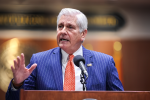Milwaukee Journal Sentinel columnist Kristin Brey hit the nail on the head when she pointed out that Wisconsin politicians need to stop calling the extra money in the state’s treasury a “surplus.”
Yes, Wisconsin ended its fiscal year with around $4.5 billion extra in the state’s bank. But calling it a surplus when many essential services are being neglected is just misleading, as Brey argues.
As I’ve mentioned several times, while the state sits on its extra billions, local property owners are left to pick up the slack. They are being burdened with higher property taxes to keep schools open and ensure teachers are paid.
At the same time, despite the state’s wealth, no help has been given to young couples struggling with the high cost of child care or to childcare centers trying to offer fair wages to caregivers. The University of Wisconsin system has had to raise tuition fees because state legislators keep cutting their contributions to higher education.
Nursing homes in Wisconsin are in a state of crisis, and our prisons are overcrowded and in terrible condition. Across the state, cities are having to hold referendums to go over the property tax limits set by the state, adding more to the tax burden on homeowners.
It’s worth remembering that Wisconsin implemented an income tax in 1911 with the goal of using the revenue to support schools and local governments. The idea was to help communities thrive with the tax money, not to let it accumulate unspent.
So, while “surplus” might technically describe the situation, Brey suggests it sends the wrong message. Referring to the money as a surplus implies that Wisconsin politicians have done a great job managing the budget, when in reality, this is the result of political gridlock, leaving struggling taxpayers behind.
“For the past three budget cycles, we have seen the same pattern: Governor Evers proposes a progressive, expensive budget. Republicans strike out his requests and craft their conservative plan filled with tax cuts.
Then, Governor Evers uses his veto powers to change the Republicans’ budget dramatically, and after a lot of political show, we are left with a budget that leaves many programs underfunded, without significant tax relief, and an unspent balance, which is called a ‘surplus,'” Brey explained.
She further added, “A surplus should not be celebrated when so many people and programs are starving for resources. I’m not saying we can solve all these problems in one budget cycle, but it is inexcusable to keep kicking the can down the road and leave an unspent balance in the general fund, especially when the state’s ‘rainy day’ fund has reached a record high of $1.9 billion.”
But will the new, more bipartisan Legislature actually address these issues? The answer seems to be no, if we listen to the GOP leaders who helped create this mess.
Instead of focusing on the real needs of the state, some Republicans want to return the surplus money to taxpayers. However, they plan to give it back as tax refunds, meaning the wealthier people get larger refunds, while families struggling with childcare costs might get only a couple of hundred dollars.
This “surplus” refund, while nice for some, won’t solve any of the pressing problems that the state faces. It won’t fix the crisis in nursing homes, overcrowded prisons, underfunded schools, or the state’s broken childcare system. It’s just a temporary solution that doesn’t tackle the deeper, systemic issues Wisconsin has been ignoring for years.
Instead of focusing on tax refunds, the money should be used to directly address the needs of schools, health care systems, and essential services that are being neglected. If the state has a real surplus, then it should use those funds to support its people—not just give it back to the wealthiest citizens in the form of tax cuts.
Wisconsin deserves a government that prioritizes the well-being of its residents rather than celebrating a surplus that doesn’t fix anything. The state’s extra billions should be used to fund essential services, help struggling families, and invest in a better future for everyone.
Disclaimer: This article has been meticulously fact-checked by our team to ensure accuracy and uphold transparency. We strive to deliver trustworthy and dependable content to our readers.







Leave a Comment